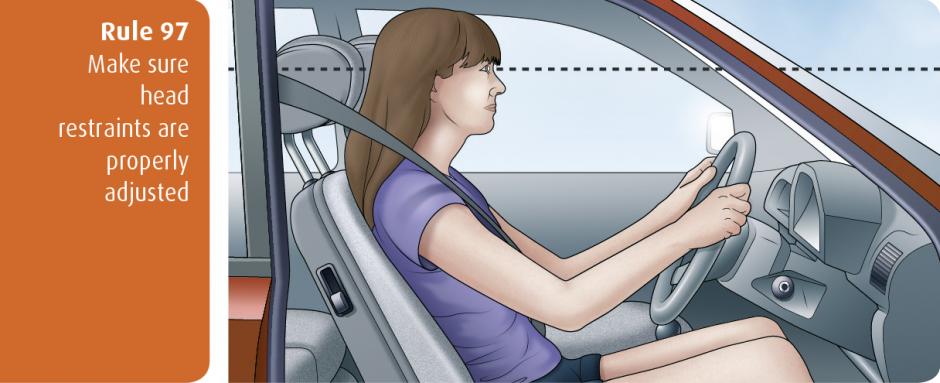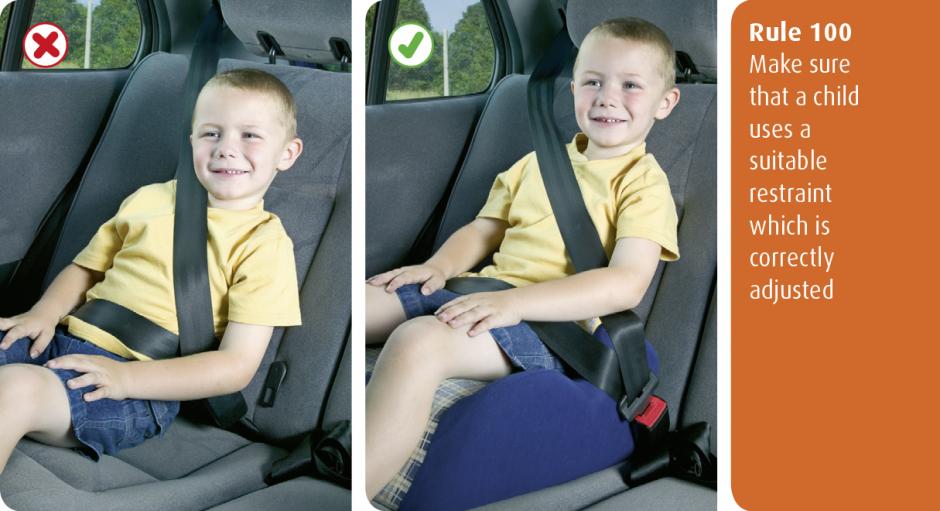Rules for drivers and motorcyclists (89 - 102)
The Highway Code for Northern Ireland's rules for drivers and motorcyclists.
General guidance
89. Vehicle condition
You must ensure your vehicle and trailer comply with the full requirements of the Motor Vehicles (Construction and Use) Regulations (NI) and the Road Vehicles Lighting Regulations (NI).
Laws CUR, RVLR
Fitness to drive
90
Make sure that you are fit to drive. You must report to the Driver & Vehicle Agency any health condition likely to affect your driving.
Law RTO 1981 Art 11
91
Driving when you are tired greatly increases your risk of collision. To minimise this risk:
- make sure you are fit to drive - do not begin a journey if you are tired (get a good night’s sleep before embarking on a long journey)
- avoid undertaking long journeys between midnight and 6.00 am, when natural alertness is at a minimum
- plan your journey to take sufficient breaks (a minimum break of at least 15 minutes after every two hours of driving is recommended)
- if you feel at all sleepy, stop in a safe place (do not stop on the hard shoulder of a motorway)
- the most effective ways to counter sleepiness are to drink, for example, two cups of caffeinated coffee and to take a short nap (up to 15 minutes)
92. Vision
You must be able to read a vehicle number plate, in good daylight, from a distance of 20 metres (or 20.5 metres where the old style number plate is used). If you need to wear glasses (or contact lenses) to do this, you must wear them at all times while driving. The police have the power to require a driver to undertake an eyesight test.
Laws RTO 1981 Art 154, MV(DL)R reg 29 & sch 7, & MVDL(A)R
93
Slow down, and if necessary stop, if you are dazzled by bright sunlight.
94
At night or in poor visibility, do not use tinted glasses, lenses or visors if they restrict your vision.
Alcohol and drugs
95
Do not drink and drive as it will seriously affect your judgement and abilities. You must not drive with a breath alcohol level higher than 35 microgrammes/100 millilitres of breath or a blood alcohol level of more than 80 milligrammes/100 millilitres of blood. Alcohol will:
- give a false sense of confidence
- reduce co-ordination and slow down reactions
- affect judgement of speed, distance and risk
- reduce your driving ability, even if you’re below the legal limit
- take time to leave your body; you may be unfit to drive in the evening after drinking at lunchtime, or in the morning after drinking the previous evening
The best solution is not to drink at all when driving, because any amount of alcohol can impair driving ability. If you are going to drink, arrange other means of transport.
Law RTO 1995 Arts 13, 15 & 16
96
You must not drive under the influence of drugs or medicine. Check the instructions or ask your doctor or pharmacist. Using illegal drugs is highly dangerous. Never take them if you intend to drive; the effects are unpredictable but can be even more severe than alcohol and may result in fatal or serious road crashes.
Law RTO 1995 Art 15
97
Before setting off. You should make sure that:
- you have planned your route and allowed sufficient time
- clothing and footwear do not prevent you using the controls in the correct manner
- you know where all the controls are and how to use them before you need them (not all vehicles are the same; do not wait until it is too late to find out)
- your mirrors and seat are adjusted correctly to ensure comfort, full control and maximum vision
- head restraints are properly adjusted to reduce the risk of neck and spine injuries in the event of a collision
- you have sufficient fuel before commencing your journey, especially if it includes motorway driving - it can be dangerous to lose power when driving in traffic
- your vehicle is legal and roadworthy
- you have switched off your mobile phone

98
Vehicle towing and loading. As a driver:
- you must not tow more than your licence permits -if you passed a car test after 1 January 1997 you are restricted on the weight of trailer you can tow
- you must not overload your vehicle or trailer - you should not tow a weight greater than that recommended by the manufacturer of your vehicle
- you must secure your load and it must not stick out dangerously - make sure any heavy or sharp objects and any animals are secured safely (if there is a collision, they might hit someone inside the vehicle and cause serious injury)
- you should properly distribute the weight in your caravan or trailer, with heavy items mainly over the axle(s) and ensure a downward load on the tow ball - manufacturers’ recommended weight and tow ball load should not be exceeded (this should avoid the possibility of swerving or snaking and going out of control - If this does happen, ease off the accelerator and reduce speed gently to regain control)
- carrying a load or pulling a trailer may require you to adjust the headlights
In the event of a breakdown, be aware that towing a vehicle on a tow rope is potentially dangerous. You should consider professional recovery.
Laws CUR reg 115 & MV(DL)R reg 32
Seat belts and child restraints
99
You must wear a seat belt in cars, vans and other goods vehicles if one is fitted (see table below). Adults and children aged 14 years and over must use a seatbelt where fitted, when seated in minibuses, buses and coaches.
Exemptions are allowed for the holders of medical exemption certificates and those making deliveries and collections in goods vehicles when travelling less than 50 metres (approx. 162 feet).
Laws RTO 1995 Arts 23 & 24, RTO 2007 Art 26, MV (WSB)R, MV(WSBCFS)R & MV(WSB)(A)R
Seat belt requirements. This table summarises the main legal requirements for wearing seatbelts in cars, vans and other goods vehicles.
| Seat belts and child restraints | Front seat | Rear seat | Who is responsible? |
|---|---|---|---|
| Driver | Seat belt must be worn if fitted | Driver | |
| Child under 3 years of age | Correct child restraint must be used |
Correct child restraint must be used. If one is not available in a taxi, may travel unrestrained |
Driver |
| Child from 3rd birthday up to 1.35 metres in height (approx 4ft 5ins) (or 12th birthday, whichever they reach first) | Correct child restraint must be used | Correct child restraint must be used where seat belts fitted. Must use adult belt if correct child restraint is not available in a licensed taxi or private hire vehicle, or for reasons of unexpected necessity over a short distance, or if two occupied restraints prevent fitment of a third | Driver |
| Child over 1.35 metres in height or 12 or 13 years | Seat belt must be worn if available | Seat belt must be worn if available | Driver |
| Adult passengers aged 14 and over | Seat belt must be worn if available | Seat belt must be worn if available | Passenger |
100
The driver must ensure that all children under 14 years of age in cars, vans and other goods vehicles wear seat belts or sit in an approved child restraint where required (see table above). If a child is under 1.35 metres (approx 4 feet 5 inches) tall, a baby seat, child seat, booster seat or booster cushion suitable for the child’s weight and fitted to the manufacturer’s instructions must be used.
Laws RTO 1995 Arts 23 & 24, MV(WSB) R, MV(WSBCFS)R & MV(WSB)(A)R

101
A rear-facing baby seat must not be fitted into a seat protected by an active frontal airbag, as in a crash it can cause serious injury or death to the child.
Laws RTO 1995 Arts 23 & 24, MV(WSB)R, MV(WSBCFS)R & MV(WSB)(A)R
102
Children in cars, vans and other goods vehicles. Drivers who are carrying children in cars, vans and other goods vehicles should also ensure that:
- children should get into the vehicle through the door nearest the kerb
- child restraints are properly fitted to manufacturer’s instructions
- children do not sit behind the rear seats in an estate car or hatchback, unless a special child seat has been fitted
- the child safety door locks, where fitted, are used when children are in the vehicle
- children are kept under control